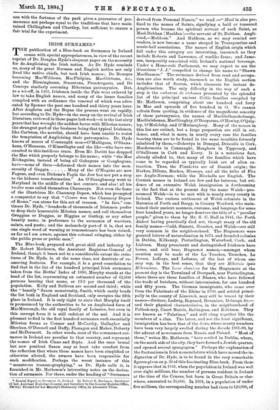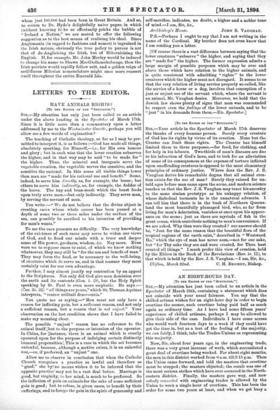IRISH SURNAMES.*
THE publication of a Blue-book on Surnames in Ireland comes with special appropriateness, in view of the recent reprint of Dr. Douglas Hyde's eloquent paper on the necessity for de-Anglicising the Irish nation. As Dr. Hyde reminds us, many of the great Norman and English nobles not only lived like native chiefs, but took Irish names ; De Bourgos becoming MacWilliams, MacPhilpins, MacGibbons, -and the Birminghams, Stauntons, Prendergasts, and De Courcys similarly assuming Hibernian patronymics. But, as a set-off, in 1465, Irishmen inside the Pale were ordered by law to take English names, and many of the lesser families complied with an ordinance the renewal of which was advo- cated by Spenser the poet one hundred and thirty years later. After Aughrim and the Boyne the process went on rapidly, but according to Dr. Hyde—in the essay on the revival of Irish literature, reviewed in these pages last week—it is the last sixty .years that has wrought the saddest havoc with Milesian names ; the strangest part of the business being that typical Irishmen, like Carleton, the novelist, should have been unable to resist the temptation of Anglicising their patronymics. Dr. Hyde knows of scores of Connaught men—O'Mulligans, O'Shana- hens, O'Honeens, O'Kinsellaghs and the like—who have snc,- .eumbed to this insidious craze. Even Mr. Davitt has dropped the Mac which properly belongs to his name ; while "the Mac EOchagains, instead of being all Gahagans or. Geoghegans, have—some of them—deformed their names into the mon- strosity of Coggin Many of the O'Hagans are now Pagans, and even Dickens's Fagin the Jew has not put a stop to the hideous transformation." An O'Shaughnessy went to Maryland in the middle of the last century, and alas ! all his twelve sons called themselves Chaunceys. Not even the fame of the illustrious Mr. Chauncey Depew, which has prompted a compatriot to say that " Cicero was the Chauncey Depew of Rome," can atone for this act of treason. " In fact," con- tinues Dr. Hyde, "hundreds of thousands of Irishmen prefer to drop their honourable Milesian names, and call themselves Groggins or Daggan, or Higgins or Guthry, or any other beastly name, in preference to the surnames of warriors, saints, and poets ; and the melancholy part of it is, that not ,one single word of warning or remonstrance has been raised, as far as I am aware, against this colossal cringing, either by the public press or public men."
The Blue-book, prepared with great skill and industry by Mr. Robert Matheson, the Assistant Registrar-General of Ireland, though it bears out to a considerable extent the stric- tures of Dr. Hyde, is, at the same time, not destitute of re- assuring features. For example, it is a great consolation to find that in the list of the hundred principal Irish surnames -taken from the Births' Index of 1890, Murphy stands at the head of the list, representing an estimated number of 62,600 persons bearing that name, or 13.3 per thousand of the population. Kelly and Sullivan are second and third ; while the " beastly" Saxon monstrosity, Smith, which easily heads the list both in England and Scotland, only occupies the fifth place in Ireland. It is only right to state that Murphy itself is pronounced by the authorities to be an Anglicised form of MaclIdurrough, the old royal family of Leinster, but even in this corrupt form it is still redolent of the soil. And it is pleasant to find in the first hundred surnames such essentially Milesian forms as Connor and McCarthy, Gallagher and Sheehan, O'Donnell and Duffy, Flanagan and Maher, Doherty and McDermott. In other words, most of the commonest sur- limes in Ireland are peculiar to that country, and represent the names of Irish Clans and Septa. And the once brutal but now penitent Saxon may at least take comfort from 'the reflection that where these names have been simplified or otherwise altered, the owners have been responsible for each modification. Perhaps the worst instance of this "monstrous transmographying," as Dr. Hyde calls it, is furnished in Mr. Matheson's interesting notes on the deriva- tion of surnames. For there, under the heading of "Surnames
* Special Report on Surname,. in Ireland. By Robert E. Matbeson. Barrister- st law, Assistant R-gistrar-General, and Secretary to the General Register Office. Dsthlinz Printed for her Majesty's Stationery Office, by Alexander Thom. derived from Personal Names," we read :—" Maol is also pre- fixed to the names of Saints, signifying a bald or tonsured person who became the spiritual servant of such Saint, as Maol-Dubhan [kfaoldunl,s—the servant of St. Dubhan. Angli- cised,—Muldoon." And Muldoon, as we may remind our readers, is now become a name steeped in Transpontine and music-hall associations. The names of English origin which fall under this category are interesting, inasmuch as they include Roberts and Lawrence, of warlike fame; and Jame- son, inseparably associated with Ireland's national beverage. Under a Home-rule Parliament, we may expect to see the illustrious "J. J." compelled to change his name to "Shawn MacShamus." The surnames derived from rank and occupa- tion are also worth study, inasmuch as the English section includes that of Sexton, which clamours for instant de- Anglicisation. The only difficulty in the way of such a step is the embarras de richeases presented by the splendid list of the principal ancient Celtic families compiled by Mr. Matheson, comprising about one hundred and forty in Mac and upwards of five hundred in 0. We cannot refrain from quoting, in evidence of the magnificent sonority of these patronymics, the names of MacGiollamoholmoge, MacGulshenan, MacOiraghty, O'Dooyarma, O'Howley, O'Quig- ley, O'Mulclohy, and O'llf ulmoghery. Many of the names in this list are extinct, but a large proportion are still in evi- dence, and, what is more, in nearly every case the families bearing them are to be found in the same localities formerly inhabited by them,—Dohertys in Donegal, Driscolls in Cork, Macdermotts in Connaught. Meaghers in Tipperary, and O'Sullivans in Coik and Kerry. It is a notorious fact, already alluded to, that many of the families which have come to be regarded as typically Irish are of alien ex- traction. Thus, the Planketts are of Danish origin; the Burkes, Dillons, Roches, Husseys, and all the tribe of Fitz are Anglo-Norman; while the Mitchells are English. The Cornish names in Ireland are few and far between, but evi- dence of an extensive Welsh immigration is forthcoming in the fact that at the present day the name Walsh—pro- nounced Welsh—is to be met with in nearly every county in Ireland. The carious settlement of Welsh colonists in the Baronies of Forth and Bargy, in County Wexford, who main- tained their ancient manners, customs, and language for some four hundred years, no longer deserves the title of a " peculiar people," given to them by Mr. S. C. Hall in 1841, the Forth dialect having practically died out, though many of the old family names—Codd, Sinnott, Rossiter, and Walsh—are still very common in the neighbourhood. The Huguenots were granted letters of naturalisation in 1674. and founded colonies in Dublin, Kilkenny, Portarlington, Waterford, Cork, and Lisburn. Many prominent and distinguished Irishmen have borne, and still bear, Huguenot names,—amongst whom mention may be made of the La Touches, Trenches, Le Fevres, Lefroys, and Lefanns, of the last of whom one may say, in the best sense, that they are Hibernia ipsis Hiberniores. The locus classicus for the Huguenots at the present day is the Townland of Deerpark, near Portarlington, where there are three families of Blanes, who have followed the trade of butchers, without intermission, for one hundred and fifty years. The German immigrants, who came over from the Palatinate of the Rhine in 1709, and settled princi- pally in the county of Limerick, may still be traced by their names—Switzer, Lodwig, Reynard, Bovanizer, Delmege, &c.— and their physical characteristics, in the neighbourhood of Pallaskenry, Court Matrix, Ballingran, and Killiheen. They are known as " Palatines," and still cling together like the members of a clan. The latest, and not the least significant, immigration has been that of the Jews, whose scanty numbers have been very largely swelled during the decade 1881.90, by the advent of newcomers from Russia and Poland. " Most of these," writes Mr. Matheson, " have settled in Dublin, where, on the south side of the city, they have formed a Jewish quarter, and opened several synagogues." Perhaps the explanation of the fluctuations in Irish nomenclature which have moved the in- dignation of Dr. Hyde, is to be found in the very remarkable figures given on p. 26 of this fascinating Blue-book. From these it appears that in 1841, when the population in Ireland was well over eight millions, the number of persons resident in Ireland at the time of the Census, but born in Great Britain or else- where, amounted to 35,000. In 1891, in a population of under five millions, the corresponding number had risen to 120,000, of whom just 100,000 bad been born in Great Britain. And so, to return to Dr. Hyde's delightfully naive paper, in which (without knowing it) he so effectually pricks the bubble of " Ireland a Nation," we are moved to offer the following suggestion as to the best means of realising his ideal. Since Anglomania (in regard to fashions and names) is ingrained in the Irish nature, obviously the true policy to pursue is not that of de-Anglicising the Irish, but of Hibernicising the English. If, for example, Mr. John Morley would be induced to change his name to Shawn MacGiollamoholmoge, then the Irish patriots would rapidly follow snit, and a golden reign of mellifluous Milesian nomenclature might once more reassert itself throughout the entire Emerald Isle.



































 Previous page
Previous page